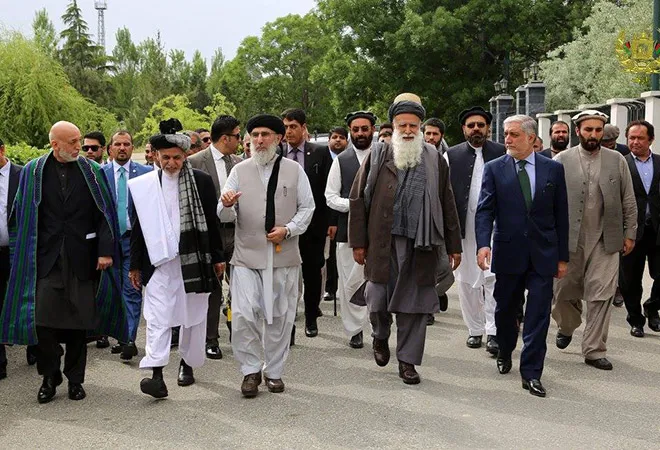-
CENTRES
Progammes & Centres
Location
Afghanistan's message is clear: the Afghan government and people want peace and they seek to achieve that peace through direct talks with the authoritative leadership of the Taliban.

Recently, a New York Times op-ed, For Peace in Afghanistan, Talk to Pakistan, said Pakistan's behaviour must change if Afghanistan is to attain stability. The authors are right. But, at the same time, they're naive in thinking that what they propose will produce such change.
First, Pakistan, which fear of India's constructive development work in Afghanistan, is a nuclear weapons state, and if its nuclear weapons are of any value to it, it is by ensuring that Pakistan no longer faces an existential threat from any power in the region and beyond. Second, the Obama and Bush administrations did exactly what the authors propose: Obama and Bush pursued an appeasement strategy of providing Pakistan with "carrots" against "sticks" of over $30 billion to secure the country's cooperation in the fight against the Taliban, which has now evolved into a transnational terrorist network.
Current and former US commanders have repeatedly called on Pakistan to close down the safe sanctuaries, the ideological indoctrination infrastructure, and the operational bases, which the Taliban conveniently utilise in Pakistan to launch daily terrorist attacks, indiscriminately killing and maiming civilians across Afghanistan. Those US military appeals have been completely ignored, as violence by the Taliban has only escalated in Afghanistan over the past two years.
That is why in the recent meeting of the Kabul Process for security and peace cooperation, President Ashraf Ghani offered an Afghan-led and Afghan-owned solution to the problem. He discussed the threats to regional stability and global peace posed by the Taliban, while outlining his vision of a dignified and just peace, which Afghanistan's been striving to achieve.
The United States and other stakeholders in the region and beyond have an opportunity to respond to the President's call for a collective action for peace, which entails the use of "sticks" against state sponsorship of terrorism.
In my last ORF article, I discussed the core principles, which underpin the Afghan peace process to be sincerely supported by Pakistan and other major stakeholders.
First, there is no substitute for state-to-state cooperation, which must underpin all regional efforts to help the government of Afghanistan reach peace with those armed groups, who are genuinely willing to enter an irreversible political settlement.
Second, sincere regional cooperation is essential for ensuring that any joint peace efforts will bear the results Afghanistan and the region ultimately seek. And that is an end to the suffering of the Afghan people, which would enable them to further consolidate their hard-earned gains of the past 16 years, in continued partnership with the international community.
Third, regional consensus on the long-term stabilisation of Afghanistan as a common good is emerging. This must continue to evolve and translate into concrete steps to be taken by each of the regional and global stakeholders, in support of an Afghan government-led and Afghan-owned peace process.
Fourth, Afghanistan rejects duplicity and selectivity in defining terrorism. This means that regional counterterrorism efforts must mirror those of national counterterrorism action plans adopted for implementation by Afghanistan's neighbours, including Pakistan.
Finally, the Taliban must realise that they cannot win militarily. The way forward shouldn't be more of the same: violence and bloodshed. Instead, Afghanistan's message to them is clear: the Afghan government and people want peace and they seek to achieve that peace through direct talks with the authoritative leadership of the Taliban. The best venue for these face-to-face peace talks is in Afghanistan or at a location mutually acceptable to both sides. In the Kabul Process for Peace and Security Cooperation meeting, President Ghani encouraged the Taliban to step forward for peace talks while warning the terror group that the government was "offering a chance for peace but.. must also be clear that this is not an open-ended opportunity."
Ashraf Haidari headed the Afghan delegation in the eleven-party and six-party meetings on peace in Afghanistan, hosted by the Government of the Russian Federation in Moscow in April and February 2017. Haidari is the Director General of Policy and Strategy of the Ministry of Foreign Affairs of Afghanistan, and formerly served as the country's Deputy Chief of Mission to India. Prior to this, he was Afghanistan’s Deputy Assistant National Security Advisor, as well as Afghan Chargé d’Affaires to the United States. He tweets @MAshrafHaidari.
The views expressed above belong to the author(s). ORF research and analyses now available on Telegram! Click here to access our curated content — blogs, longforms and interviews.

Ashraf Haidari was a Visiting Fellow at ORF. He also serves as Extraordinary and Plenipotentiary Ambassador of Afghanistan to Sri Lanka.
Read More +